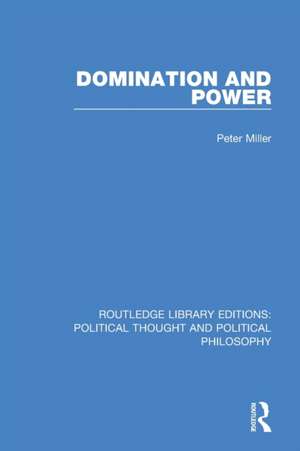Domination and Power: Routledge Library Editions: Political Thought and Political Philosophy
Autor Peter Milleren Limba Engleză Paperback – dec 2021
Miller identifies the notion of subjectivity as central to a differentiation of the respective approaches of Critical Theory and Foucault. For Critical Theory it is the repression of subjectivity which provides the evidence of domination and the rationale for its critique, while for Foucault subjectivity in western societies is fabricated through power and linked to the deployment of specific knowledges. Miller shows that despite the achievements of Critical Theory in bringing to light the repressive nature of advanced industrial societies, its thinking is inadequate as a basis for future analysis and critique. He argues that Foucault’s genealogy of the modern subject, which highlights the role of the human sciences in its fabrication, is a more fruitful basis for charting and investigating the mode of operation of contemporary forms of power.
The book includes a survey of all published works by Foucault, up to the time of his death in 1984, and commentaries on the writings of Max Horkheimer, Herbert Marcuse and Jürgen Habermas.
| Toate formatele și edițiile | Preț | Express |
|---|---|---|
| Paperback (1) | 325.87 lei 43-57 zile | |
| Taylor & Francis – dec 2021 | 325.87 lei 43-57 zile | |
| Hardback (1) | 629.11 lei 43-57 zile | |
| Taylor & Francis – 4 dec 2019 | 629.11 lei 43-57 zile |
Din seria Routledge Library Editions: Political Thought and Political Philosophy
-
 Preț: 268.59 lei
Preț: 268.59 lei -
 Preț: 362.33 lei
Preț: 362.33 lei -
 Preț: 245.31 lei
Preț: 245.31 lei -
 Preț: 246.31 lei
Preț: 246.31 lei - 18%
 Preț: 782.44 lei
Preț: 782.44 lei - 18%
 Preț: 786.54 lei
Preț: 786.54 lei - 18%
 Preț: 790.03 lei
Preț: 790.03 lei - 34%
 Preț: 680.73 lei
Preț: 680.73 lei - 34%
 Preț: 525.51 lei
Preț: 525.51 lei - 18%
 Preț: 891.36 lei
Preț: 891.36 lei - 18%
 Preț: 891.36 lei
Preț: 891.36 lei - 18%
 Preț: 891.36 lei
Preț: 891.36 lei - 18%
 Preț: 891.36 lei
Preț: 891.36 lei - 33%
 Preț: 832.70 lei
Preț: 832.70 lei - 34%
 Preț: 680.73 lei
Preț: 680.73 lei - 39%
 Preț: 680.73 lei
Preț: 680.73 lei - 18%
 Preț: 778.65 lei
Preț: 778.65 lei - 18%
 Preț: 1132.71 lei
Preț: 1132.71 lei - 18%
 Preț: 787.17 lei
Preț: 787.17 lei - 18%
 Preț: 789.22 lei
Preț: 789.22 lei - 34%
 Preț: 1181.73 lei
Preț: 1181.73 lei - 18%
 Preț: 782.44 lei
Preț: 782.44 lei - 39%
 Preț: 683.91 lei
Preț: 683.91 lei - 18%
 Preț: 961.74 lei
Preț: 961.74 lei - 18%
 Preț: 699.96 lei
Preț: 699.96 lei - 15%
 Preț: 556.77 lei
Preț: 556.77 lei - 15%
 Preț: 697.34 lei
Preț: 697.34 lei - 18%
 Preț: 782.44 lei
Preț: 782.44 lei - 18%
 Preț: 785.44 lei
Preț: 785.44 lei - 18%
 Preț: 695.71 lei
Preț: 695.71 lei - 18%
 Preț: 787.97 lei
Preț: 787.97 lei - 18%
 Preț: 785.93 lei
Preț: 785.93 lei - 18%
 Preț: 699.02 lei
Preț: 699.02 lei - 18%
 Preț: 892.92 lei
Preț: 892.92 lei - 33%
 Preț: 629.11 lei
Preț: 629.11 lei - 18%
 Preț: 891.36 lei
Preț: 891.36 lei - 18%
 Preț: 782.44 lei
Preț: 782.44 lei - 18%
 Preț: 945.80 lei
Preț: 945.80 lei - 34%
 Preț: 626.65 lei
Preț: 626.65 lei - 18%
 Preț: 891.36 lei
Preț: 891.36 lei - 33%
 Preț: 747.39 lei
Preț: 747.39 lei - 36%
 Preț: 708.55 lei
Preț: 708.55 lei - 52%
 Preț: 491.24 lei
Preț: 491.24 lei - 18%
 Preț: 891.36 lei
Preț: 891.36 lei - 34%
 Preț: 20610.59 lei
Preț: 20610.59 lei
Preț: 325.87 lei
Nou
Puncte Express: 489
Preț estimativ în valută:
62.36€ • 65.27$ • 51.90£
62.36€ • 65.27$ • 51.90£
Carte tipărită la comandă
Livrare economică 31 martie-14 aprilie
Preluare comenzi: 021 569.72.76
Specificații
ISBN-13: 9780367253943
ISBN-10: 0367253941
Pagini: 282
Dimensiuni: 156 x 234 x 15 mm
Greutate: 0.52 kg
Ediția:1
Editura: Taylor & Francis
Colecția Routledge
Seria Routledge Library Editions: Political Thought and Political Philosophy
Locul publicării:Oxford, United Kingdom
ISBN-10: 0367253941
Pagini: 282
Dimensiuni: 156 x 234 x 15 mm
Greutate: 0.52 kg
Ediția:1
Editura: Taylor & Francis
Colecția Routledge
Seria Routledge Library Editions: Political Thought and Political Philosophy
Locul publicării:Oxford, United Kingdom
Public țintă
General, Postgraduate, and UndergraduateCuprins
Acknowledgments; Introduction: Subjectivity and Power; Part One: Critical Theory; 1. Max Horkheimer and Cultural Critique 2. Herbert Marcuse and Subjectivity as Negation 3. Jurgen Habermas: Human Interests, Communication and Legitimation; Part Two: Michel Foucault: Genealogies of the Subject; 4. Unreason to Madness: The Knowledge of Subjectivity 5. The Birth of Medicine and the Individualisation of the Body 6. The Human Sciences and the Birth of Man 7. From Disciplinary Power to Governmentality; Conclusion; Notes; Selected Bibliography; Index
Descriere
First published in 1987. Our understanding of the nature of power in western societies is currently undergoing a major reassessment. The significance of this reassessment emerges forcefully through comparing the writings of the principal exponents of Critical Theory with those of Michel Foucault.
